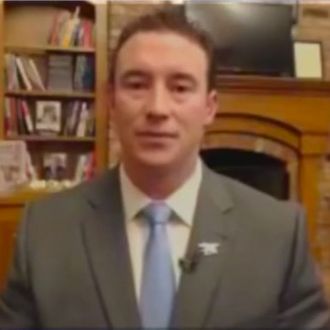
During his 60 Minutes interview last weekend, Donald Trump repeatedly told those fearful of what his presidency could bring, “Don’t be afraid.” So far he’s made no further effort to calm the public, even as his supporters suggested that some of people’s worst fears about a Trump administration are completely founded.
One extreme example: Carl Higbie, former Navy SEAL and spokesman for the pro-Trump Great American PAC, argued Wednesday night on Fox News that a registry of immigrants from Muslim countries would pass constitutional muster, citing the internment of Japanese-Americans during World War II. Here’s part of his exchange with Megyn Kelly:
HIGBIE: Yeah, and to be perfectly honest, it is legal. They say it will hold constitutional muster. I know the ACLU is gonna challenge it, but I think it’ll pass, and we’ve done it with Iran back – back a while ago. We did it during World War II with Japanese, which, you know, call it what you will, maybe —
KELLY: Come on. You’re not — you’re not proposing we go back to the days of internment camps, I hope.
HIGBIE: No, no, no. I’m not proposing that at all, Megyn, but what I am saying is we need to protect America from —
KELLY: You know better than to suggest that. I mean, that’s the kind of stuff that gets people scared, Carl.
HIGBIE: Right, but it’s — I’m just saying there is precedent for it, and I’m not saying I agree with it, but in this case I absolutely believe that a regional based —
KELLY: You can’t be citing Japanese internment camps as precedent for anything the president-elect is gonna do.
HIGBIE: Look, the president needs to protect America first, and if that means having people that are not protected under our Constitution have some sort of registry so we can understand, until we can identify the true threat and where it’s coming from, I support it.
Higbie’s overall argument is correct. Kansas secretary of State Kris Kobach, a Trump immigration adviser, suggested on Tuesday that the president-elect might reinstate a registry of Muslims entering the country on visas from countries that pose a terror threat. Though many people were unaware of it, that system — the National Security Entry-Exit Registration System — was in effect from 2002 to 2011. Legal challenges of the program did not get very far, and several constitutional law experts told Politico that a similar program would probably be allowed to continue today.
Judges will not, however, base that decision on the precedent set by the internment of Japanese-Americans. In 1942, roughly 120,000 people of Japanese ancestry living in the U.S. — including 62 percent who were U.S. citizens — were forcibly relocated to detention camps following an executive order issued by President Franklin Roosevelt.
The Supreme Court upheld the order in its 1944 decision Korematsu v. United States. Technically, the decision stands, as no case involving rounding up American citizens has come before the Court since then. However, Justice Antonin Scalia said it was one of the most shameful mistakes in the Court’s history, and Justice Stephen G. Breyer said it has been “so thoroughly discredited” that it is “hard to conceive of any future court referring to it favorably or relying on it.”
As for the suggestion that Muslim immigrants “are not protected under our Constitution,” that’s only partly true. As Slate explained, “Congress has nearly full authority to regulate immigration without interference from the courts.” However, they do have some protections, thanks to the 14th Amendment, which states, “No state shall … deprive any person of life, liberty or property, without due process of law; nor deny to any person within its jurisdiction the equal protection of the laws.” Even an undocumented immigrant counts as a “person,” and the courts have repeatedly ruled that they are entitled to a jury trial, due process, protection from unlawful search and seizure, and various other constitutional rights.
Nevertheless, after his Kelly File appearance, Higbie appeared to reject the fact that every person who enters the U.S. has some rights under the Constitution.
While Trump himself hasn’t said anything about internment camps or a Muslim registry in recent weeks, those fears weren’t sparked by comments from random Trump surrogates. Trump stirred confusion in December when he said he didn’t know if he would have opposed Japanese internment camps during World War II. “I certainly hate the concept of it,” he said. “But I would have had to be there at the time to give you a proper answer.”
When asked to clarify whether he would consider internment camps for American Muslims, he said he’d “rule it out, but we would have to be very vigilant. We’re going to have to be very smart.”
A year ago, there was a similar controversy over whether Trump was in favor of a Muslim database — possibly even including U.S. citizens. After suggesting he was open to registering all Muslims — and snapping “you tell me” at a reporter who asked how that would be different from the registry for Jews in Nazi Germany — Trump walked back his remarks. After combing through several “contradictory or confusing” statements, Politifact concluded: “It seems that Trump definitely wants a database of Syrian refugees, and he hasn’t ruled out the possibility of a database for all Muslims — though he isn’t actively calling for the latter.”






























